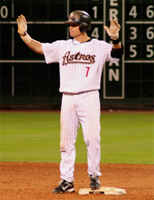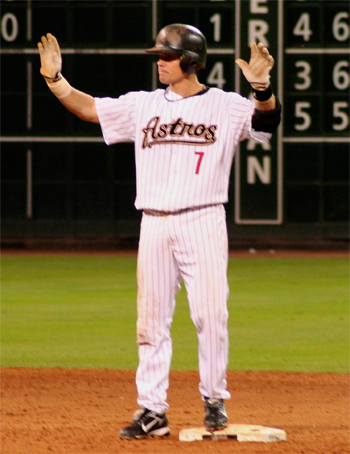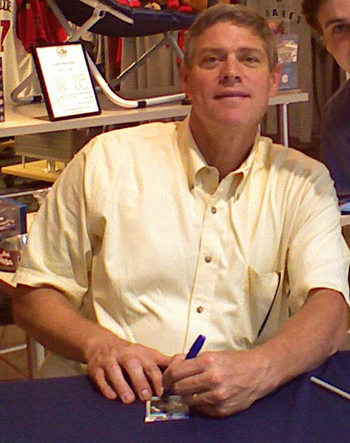
By Derek Rosenfeld
It was a day that was considered the baseball equivalent of 12/21/12. Although “1/9/13” doesn’t have quite the dreadful ring as did the recent end of the Mayan calendar, the Baseball Writers’ Association of America (BBWAA) took great pains in exacting its own form of “Montezuma’s Revenge” on baseball’s Steroids Era by shutting out every player on the Baseball Hall of Fame’s (HOF’s) eligibility list. As a result, the attitude about what the HOF now means has been put into question as never before.
The BBWAA did the right thing by voting “No” to every eligible player who appeared on this year’s ballots; it was the first time since 1996 that no one was elected to the HOF. As expected, there have been the usual outcries of homer fans and stat-head aficionados that have straddled the fence between general acceptance and righteous indignation. The voters themselves have borne the brunt of these hostilities, from people questioning the integrity of writers’ personal lives to their very relevance; Let it be understood that lying on your taxes or cheating on your wife, accusations levied on the voters, has nothing to do with public affairs.
Such is the attitude of people who have drastically differing opinions on how we should honor our past and modern day sports heroes within the confines of one building. Of the many issues surrounding this concept is the drastically different eras in which the game’s best played. Cy Young amassed an ungodly amount of wins (511) during a time when pitching doubleheaders, a soft ball, and bouncing the ball for a strike were accepted parts of the game. Ty Cobb and Honus Wagner played when batting over .400 was possible for the best hitters (Cobb accomplished this for five consecutive seasons!). Babe Ruth never played against black or Hispanic players. And now we have an era where many of the games players—let alone BEST players—were on performance enhancing drugs (PEDs), which inflated regular season and career numbers to the point that they now are no longer being taken seriously amid the game’s historical context.
Every era of baseball has seen its share of variables that make disseminating the best ever from across the generations a futile proposition, but no other vote in history has had quite the impact as this month’s. Despite the fact that HOF voters have admitted some extremely dubious HOF inductees in the past 10 years such as Bill Mazeroski, Jim Rice, and Andre Dawson, the scrutinizing of this year’s vote has brought a new level of attention to the state of evaluating players not just at as athletes but as human beings as well.
Back in late 2010/early 2011, I wrote a four-part series on the HOF and how it may evaluate its upcoming batch of eligible candidates. Now that this year’s vote has passed, let’s look at some other HOF nominees who I missed the first time around, the pros and cons of their careers, and some players I assessed and how the voters reacted to their appearance on the ballot.
CRAIG BIGGIO—Houston Astros, C, 2B, CF (1st year, Received 68.2% of votes). 
Amid the hoopla of the Bonds—Clemens—Sosa circus (which I will discuss in Part 2), there were a few candidates on the ballot who were never linked to PEDs who were deemed as being caught in the middle of the firestorm, losing votes based on the controversy of their HOF class, and thus were considered as being wrongly left out of the hallowed halls. The biggest snub was Biggio, a seven-time all-star who made the midsummer classic as a catcher AND a second baseman (his primary position). He ended his 20-year career in 2007 with 3,060 hits, 291 home runs, 414 stolen bases, and more doubles (668) than any right-handed hitter in baseball history. He played his entire career in one city, and he was one of those players labeled by fans and the media as a guy who “played the game the right way.” So why was Biggio, with that type of pedigree, left out?
A closer examination of his career makes a strong case for the writers’ decision. Even during the Steroid Era, Biggio was never considered one of the 10 best players in his league. He garnered MVP votes just five times (finishing as high as 4th in 1997) and, despite having 3,000 hits, finished with a lifetime .281 batting average while hitting over .300 just four times—pedestrian by HOF standards. His numbers, many will rightfully argue, were the result of his durability. Biggio averaged 142 games played per season and has the 12th highest at-bats total in Major League Baseball (MLB) history (10,876). In addition, he played the final eight seasons of his career in Minute Maid (formerly Enron) Park, a ridiculous hitter-friendly field that allowed Biggio to pad his stats even as his skills waned. From 2000-2007, he batted just .245 on the road with little to no power, as opposed to being a .285 hitter at home, where he hit the vast majority of his late-career home runs. Thus, he has been saddled with the reputation of being a classic “compiler.”
Biggio deserves to and will be voted into the HOF either in 2014 or 2015; his lifetime numbers warrant admission. However, his passing over for induction as a “first-ballot” guy makes sense, with or without the light of controversy on those who played around him.
JACK MORRIS—Detroit Tigers, three other teams; P (14th year, received 67.7% of votes).
Often dubbed the “Best Pitcher of the 1980s,” Jack Morris was a three-time 20-game winner and anchored not one but three World Series-winning staffs during his 18 seasons in the bigs. His 162 wins led the decade of the ‘80s, and he is considered one of the top postseason pitchers of his era. However, Morris missed the cut yet again in 2013, and 2014 will be his 15th and final chance at getting into Cooperstown as a non-Veteran’s Committee inductee.
Once again, I side with the BBWAA on Morris. For starters, his 3.90 career earned run average (ERA) has hung around his neck like an albatross, and rightfully so. At almost one run higher than the HOF average, it ranks 743rd all-time.1 If inducted, he would have the highest ERA of any pitcher in the HOF.
Also, I’ve always felt it was tough to endorse any pitcher for the HOF, one who is to be considered one of the best of all time, when he was never the best in the game in any one year of his career, as evidenced by Morris never winning a Cy Young Award. He finished in 3rd place twice (the strike-shortened 1981 campaign and 1983) and landed in the top 10 seven times, but his ERA consistently kept him from finishing higher. By this measure, it can be argued that Morris benefitted from pitching for many great teams with high-powered offenses such as the early ‘90s Blue Jays and Twins, which constantly staked him to big leads, for which an average performance could get him a W.
Morris supporters point to his success in the postseason, and how he pitched one of the greatest games in World Series history—a 10-inning shutout in Game 7 vs. Atlanta in 1991. However, a closer look at his playoff numbers show striking similarities to his regular season performance; he went 7-4 with a 3.80 ERA. Of course, supporters will also point to the fact that pitchers with similar careers such as Don Sutton, Phil Niekro, and the recently inducted Bert Blyleven should open the door for a pitcher like Morris. However, those pitchers, although considered compilers, had better, more sabermetric-friendly career numbers than Morris, not to mention much lower ERAs.
Morris was a great pitcher, but after the BBWAA took a closer look at his career, it was apparent that he was not HOF material. Morris’ chances of induction will face a huge hurdle in 2014 when Randy Johnson, Greg Maddux, and Tom Glavine make their first appearance on the ballot.
Morris may have a chance to get in through the Veteran’s Committee if he is not voted in next year, but his induction at any time would most likely be considered yet another lowering of the bar for HOF standards.
DALE MURPHY—Atlanta Braves, two other teams; OF (15th year, received 18.6% of votes).
Before the start of the 1988 season, Dale Murphy looked poised to join the ranks of Willie Mays, Mickey Mantle, and other all-time great centerfielders who grace the HOF. He had won two MVP awards, hit 310 home runs, had 927 RBIs, and won five Gold Glove Awards, all in the pre-PED 1980s. Additionally, Murphy was consistently voted as THE most popular player in the entire game in fan polls. Then, something strange happened.
That season, Murphy went on to hit .226 with a weak, uncharacteristic .734 on-base + slugging average (OPS). And it was not just an aberration. Little did Braves fans know, it was the beginning of one of the most precipitous slides for an established star in modern baseball history. By the middle of 1990, with his struggles continuing, Murphy was traded to the Philadelphia Phillies to make room for emerging star David Justice. Murphy then dropped off the face of the Earth, ending his career quietly in Colorado in 1993 with none of the fanfare many would have expected for the Braves hero back in 1987.
Much was made after this year’s vote that Murphy’s name will now be transferred over to the Veteran’s Committee after this, his 15th and final year on the BBWAA’s ballots. Like Alan Trammell and Morris, Murphy’s supporters have been vehement that he is being drastically overlooked. They say his 398 career home runs and two MVP awards should not go unnoticed, and above all, unlike the Steroid Era candidates, he has the benefit of having great character traits.
Being a model citizen has its benefits, but again, the voters were correct in passing on Murphy. He simply did not sustain his period of greatness long enough to merit induction. After putting up HOF-worthy numbers in the first half of his career, he would go on to hit just .234 with 88 home runs and a .702 OPS in parts of six unremarkable seasons.
 Interestingly enough, Murphy’s decline can be seen most recently in another Atlanta Braves centerfielder: Andruw Jones (left). Jones was in the discussion as the greatest defensive CF of all time and a home run machine before his production dropped off a cliff after he turned 30. His prospects have fallen off so far that, after bouncing around the MLB as a bench player the last five seasons, he now finds himself playing in Japan for the 2013 season.
Interestingly enough, Murphy’s decline can be seen most recently in another Atlanta Braves centerfielder: Andruw Jones (left). Jones was in the discussion as the greatest defensive CF of all time and a home run machine before his production dropped off a cliff after he turned 30. His prospects have fallen off so far that, after bouncing around the MLB as a bench player the last five seasons, he now finds himself playing in Japan for the 2013 season.
In part two, I will look at the Steroid Era players, both known and suspected, and how their very presence on the ballot has changed the perception of the HOF going forward.
ENDNOTES
Biggio, Murphy, and Jones photos found on Wikimedia Commons courtesy of UCinternational (2) and Youngamerican.
 Derek Rosenfeld is an associate editor for Fire Engineering. He is an assistant baseball coach at Bloomfield (NJ) College, a NCAA D-II program that plays in the wood bat Central Atlantic Collegiate Conference. He has coached baseball at the collegiate level for eight seasons, including stints at New Jersey’s Bergen Community College and Ramapo College. He has also been an infielder in several highly competetive semipro baseball leagues throughout the New York tri-state area.
Derek Rosenfeld is an associate editor for Fire Engineering. He is an assistant baseball coach at Bloomfield (NJ) College, a NCAA D-II program that plays in the wood bat Central Atlantic Collegiate Conference. He has coached baseball at the collegiate level for eight seasons, including stints at New Jersey’s Bergen Community College and Ramapo College. He has also been an infielder in several highly competetive semipro baseball leagues throughout the New York tri-state area.
During the mid-90s, Rosenfeld was a three-year starter at second base for the Ramapo College baseball team in Mahwah, New Jersey, where he earned all-New Jersey Athletic Conference honors and was a two-time New Jersey Collegiate Baseball Association (NJCBA) all-star selection. He was named MVP of the 1997 NJCBA All-Star Game. He has a bachelor’s degree in communications from Ramapo College.


